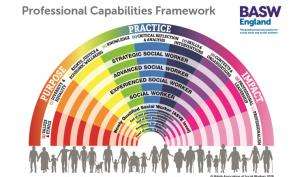PCF Latest
Frequently asked questions
What is the PCF?
The PCF is the Professional Capabilities Framework and is a framework for social work practice and learning in England.
It sets out nine common domains of capability that we expect to develop as social workers, and which others can expect of us. It promotes and underpins social work as ‘one profession’ across all specialisms and roles. It supports social workers to meet the requirements of the professional regulator, specific guidance and policy for particular job roles, and is aligned with the International Federation of Social Workers (IFSW) global definition of social work through the BASW Code of Ethics for social workers across the UK. The PCF does not define all the specialist knowledge, skills or learning content that may be needed in particular work contexts or roles. (For instance, the Knowledge and Skills statements are additional current governmental guidance on knowledge and skills for statutory children’s and adults social work in England).
Rather, the PCF identifies how we should act and approach our work through common capabilities that relate to our purpose, practice and our commitment to having an impact and making a difference to people’s lives. It underpins our continuing professional development because it helps us identify and map how to learn and improve through the different stages and aspects of our careers. It supports employers, workforce leads, managers and supervisors as well as individual social workers in developing social work careers and ongoing professional learning.
The PCF has been our framework for social work in England since 2012 and its implementation across the sector – from qualifying training through to strategic workforce planning – is widespread and it is well embedded. The PCF may evolve as our profession and our learning evolve.
What is a 'super domain'?
The PCF 2018 introduces a new feature – the ‘super domains’.
These cluster the nine domains into three areas with the overarching titles of:
- Purpose: Why we do what we do as social workers, our values and ethics, and how we approach our work
- Practice: What we do – the specific skills, knowledge, interventions and critical analytic abilities we develop to act and do social work
- Impact: How we make a difference and how we know we make a difference. Our ability to bring about change through our practice, through our leadership, through understanding our context and through our overall professionalism.
Each super-domain sits over three domains that particularly relate in a common-sense way with the super-domain above. However, the principles of purpose, practice and impact can also be seen as cutting across all domains, so there is no hard, visual demarcation between the super-domains. For instance, ‘impact’ can be directly related to interventions and skills, and ‘professionalism’ may be considered directly related to ‘purpose’ and the ethics behind how you approach your work.
All 9 domains can be directly related to ‘Practice’, an example being the integration of ‘rights and justice’ is fundamental to how social workers make interventions and apply their skills in practice. We have moved the ‘Professionalism’ domain to the bottom right corner on the graphic. The reasoning for this is that we believe professionalism sits well with ‘Professional leadership’ and ‘Contexts and Organisations’ under the ‘Impact’ super-domain. However, despite moving ‘professionalism, in the graphic, to avoid disrupting the widespread use of numbered domains (e.g. in teaching materials in universities) we have left the numbers as they were The super-domains do not undermine the concept that there are interrelationships between all the domains of the PCF.
What is a domain descriptor?
The domain descriptors describe key areas of social work practice. These were refreshed in 2018 following wide consultation.
- Professionalism
- Values and Ethics
- Diversity and Equality
- Rights, Justice and Economic Well Being
- Knowledge
- Critical Reflection and Analysis
- Intervention and Skills
- Contexts and Organisations
- Professional Leadership
What is a level descriptor?
A level descriptor describes the roles and titles that align to these levels.
On the new fan graphic, the level descriptors have been simplified to:
The four pre-qualifying levels;
and another five levels beyond;
- Newly qualified social worker (ASYE level)
- Social worker
- Experienced social worker
- Advanced social worker
- Strategic social worker
The PCF is not prescriptive about how job roles and titles match on to these levels. It is likely that roles and titles will become more diverse at more senior and/or advanced levels of practice. This simplified graphic is accompanied by overarching descriptions of the types of role and a summary of the level of capability at each level.
The following principles have been applied.
- Keep it simple!
- For qualified levels, include in the level descriptors role examples that are contemporary and keep them updated. Include the roles emerging from KSS (Knowledge and Skills Statement).
- Ensure that non-statutory social workers can map their roles on to the levels e.g. from charity, private and independent/freelance contexts
What is the relationship between the PCF and KSS?
The PCF is not a curriculum content guide for all social work development and was not created to be such. Rather, it is the framework of generic capabilities and professional development onto which specific areas of practice knowledge and skill can be built (e.g. capabilities for social work with older people).
The need to align with the KSS has been raised throughout the refresh process. We have agreed a joint statement with the Department for Health and Social Care and the Chief Social Worker for Adults, and the Department for Education and Chief Social Worker for Children. This aims to simply state how the KSS map on to the Practice domains of the PCF. In relation to the KSS, a joint statement between DHSC, DfE and BASW was issued on 2nd March 2018.
This clarifies that ‘The KSS set out what a social worker should know, and be able to do, in specific practice settings, in specific roles and at different levels of seniority. The KSS map onto the Practice domains of the PCF (Knowledge, Critical Reflection and Analysis, Interventions and Skills) and should help guide everyday practice.’
The full joint statement on the PCF and KSS can be read here.
Work to align the PCF and KSS will be ongoing, through dialogue between BASW and the DHSC and DfE.
See our document: Mapping the PCF, KSS and Regulatory Standards in England.
Guidance on using the 2018 refreshed PCF
The Professional Capabilities Framework (PCF) is the profession-owned backbone of social work education and professional development in England.
First devised in 2012, the PCF has been reviewed and refreshed through a process of extensive consultation during 2017 and 2018. This has been led by BASW in conjunction with Research in Practice. The review has preserved the best of the PCF and elements that consultation respondents considered to be most important and useful, while modernising, clarifying and developing key aspects.
The refreshed PCF fan graphic (2018)

Each super-domain sits over three domains that particularly relate in a common-sense way with the super-domain above. However, the principles of purpose, practice and impact can also be seen as cutting across all domains, so there is no hard, visual demarcation between the super-domains.


